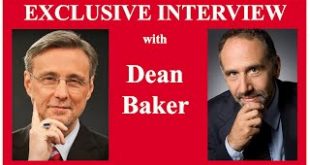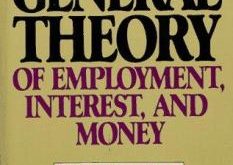Provided to YouTube by Label Worx Limited Catch A Groove (Dean Baker Remix) · Paul Deighton · Dean Baker Catch A Groove ℗ Copyright Control Released on: 2021-08-16 Producer: Paul Deighton Composer: Paul Deighton Music Publisher: Copyright Control Auto-generated by YouTube.
Read More »Economics can no longer evade political economy
from Jamie Morgan and current issue of RWER If climate emergency indicates anything, it is that we are urgently in need of an economics that is “fit for purpose”. Consider what “fit for purpose” now means. An adequate economics now has to be one that helps us understand the difficult decisions that are likely to confront us in the coming years. On a global scale we are going to have to leave fossil fuels in the ground, restore aquifers and water systems, reinvigorate ecosystems, greatly...
Read More »Why there is no relationship between truth and logic
from Lars Syll To be ‘analytical’ and ‘logical’ is something most people find recommendable. These words have a positive connotation. Scientists think deeper than most other people because they use ‘logical’ and ‘analytical’ methods. In dictionaries, logic is often defined as “reasoning conducted or assessed according to strict principles of validity” and ‘analysis’ as having to do with “breaking something down.” But that’s not the whole picture. As used in science, analysis usually means...
Read More »A matter of institutional power
from Lukas Bäuerle and current issue of RWER Pressing arguments for a paradigm shift in economics – based on an assessment of mainstream economics and its shortcomings – are out there for quite a while now. The emperor has been declared long dead in intellectual terms (Keen, 2001), but it is still firmly alive institutionally. This is the only reason why we still have to talk about it at all. Having said this, it goes without saying that the “intellectual monoculture” (Graupe, 2015) in...
Read More »The neoliberal failure of historic proportions
from John Komlos and current issue of RWER We are at the cusp of a new era. The 21st century did not begin in earnest until 2008, signifying a seismic break with the past in ways far too numerous to mention. To be sure, the Dot-Com bubble could have served as a lesson for the vulnerability of Wall Street and that it desperately needed vigilant oversight, but the economy emerged from that short recession relatively unscathed, and the warning sign was misunderstood. Sure, myriad of astute...
Read More »Dean Baker Joins Thom to talk about Quantitative Easing and How It Affects the Citizens of the U.S.
Dean baker joins Thom Hartmann in this very exclusive interview! This interview is from Thom's Thursday 8.5 show! Never miss The Thom Hartmann Program! The Thom Hartmann Program is live every week day from 12:00pm - 3:00pm eastern on PoliticalVoicesNetwork.com!
Read More »Weekend read: Some thoughts on a post-neoliberal project
from Richard Parker and current issue of RWER So then what might a project for a Post-Neoliberal Economics entail? Since I think “neoliberalism” as concept and practice represents one more of an ongoing series of ultimately ad hoc justifications for the hierarchic structuring of human societies, and think that the larger concept of “capitalism” contains already many visibly differentiated stages of its own in that long story of hierarchies, here are several modest ideas I’d propose....
Read More »Quantitative Easing? Big Words To Make The Rich Richer? (w/ Dean Baker)
Quantitative Easing impacts us all, even we don’t understand it. The Fed starts buying bonds, which lifts the stock market and lifts profits. This only benefits rich people – or does it? Discover how it affects your mortgage, car loans and so much more. ? Subscribe for more clips like this: https://www.youtube.com/user/thomhartmann?sub_confirmation=1 Dean Baker joined Thom explains quantitative easing and why it impacts our pockets. Dean Baker is the Co-Founder & Senior...
Read More »Why MMT rejects the loanable funds theory
from Lars Syll Government deficits always lead to a dollar-for-dollar increase in the supply of net financial assets held in the nongovernment bucket. That’s not a theory. That’s not an opinion. It’s just the cold hard reality of stock-flow consistent accounting. So fiscal deficits — even with government borrowing — can’t leave behind a smaller supply of dollar savings. And if that can’t happen, then a shrinking pool of dollar savings can’t be responsible for driving borrowing costs...
Read More »Three problems with Milton Friedman’s call for free markets
from Richard Koo in current issue of RWER When Milton Friedman visited Japan in the 1950s and spoke to economist Kazushi Nagasu, he had strong things to say about the plight of his people: “I am a Jew…I do not think I need to tell you what kind of horrible deaths Jewish people had to face. The real drive behind my argument for free markets is the bloodied cries of Jewish people who perished under Hitler’s and Stalin’s regimes, and their message is that the best way to happiness is to...
Read More » Real-World Economics Review
Real-World Economics Review




